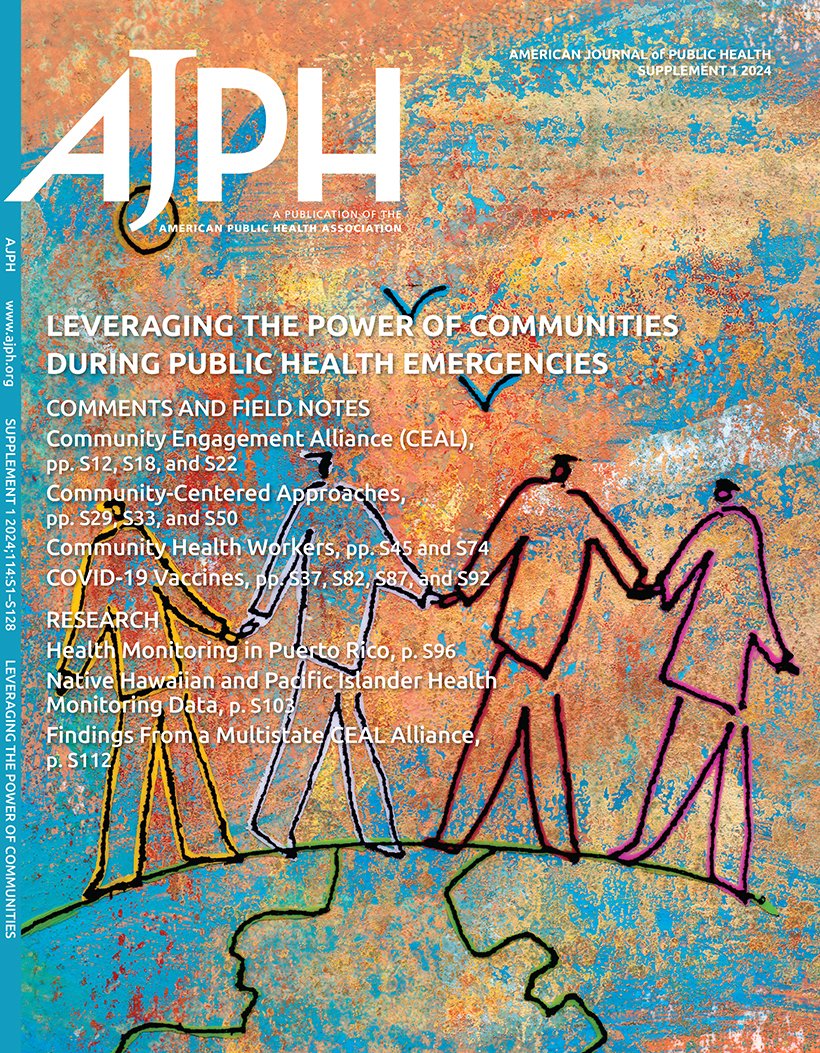Mental Health of Emerging Adults in New York City in 2023.
IF 9.6
1区 医学
Q1 PUBLIC, ENVIRONMENTAL & OCCUPATIONAL HEALTH
引用次数: 0
Abstract
Objectives. To investigate the prevalence of serious psychological distress (SPD), mental health treatment, unmet need for mental health treatment, social isolation, and barriers to treatment access among emerging adults, aged 18 to 24 years, and compared with older adults. Methods. We use data from the New York City (NYC) Neighborhood Wellness Survey (2023), a representative survey of adults in NYC (n = 43 606), to calculate weighted prevalence estimates and fit logistic regression models controlling for sociodemographic characteristics. Results. Emerging adults had higher odds of SPD and social isolation than adults aged 35 to 44 years, 45 to 64 years, and 65 years or older, and lower odds of past-year mental health treatment among those with SPD compared with all other age groups. Emerging adults reported different reasons for unmet need for mental health treatment than other age groups. Among emerging adults, individuals who identified as noncisgender, bisexual, or unsure of their sexual orientation, or who experienced financial strain, violence, or discrimination, had poorer mental health outcomes. Conclusions. These findings demonstrate the need for expanded efforts to increase mental health treatment access focused on those aged 18 to 24 years, as their needs may differ from those of other age groups. (Am J Public Health. Published online ahead of print July 10, 2025:e1-e10. https://doi.org/10.2105/AJPH.2025.308163).2023年纽约市新生成人的心理健康
目标。调查18 - 24岁新生成人的严重心理困扰(SPD)、心理健康治疗、未满足的心理健康治疗需求、社会隔离和获得治疗障碍的患病率,并与老年人进行比较。方法。我们使用纽约市(NYC)社区健康调查(2023)的数据,这是一项对纽约市成年人的代表性调查(n = 43 606),计算加权患病率估计值,并拟合控制社会人口统计学特征的logistic回归模型。结果。与35岁至44岁、45岁至64岁、65岁及以上的成年人相比,刚成年的人患SPD和社会孤立的几率更高,与所有其他年龄组相比,SPD患者过去一年接受心理健康治疗的几率更低。新兴成人报告的未满足心理健康治疗需求的原因与其他年龄组不同。在刚成年的人群中,被认定为非顺性、双性恋或不确定自己性取向的人,或经历过经济压力、暴力或歧视的人,心理健康状况较差。结论。这些发现表明,有必要扩大努力,以增加18至24岁人群获得精神卫生治疗的机会,因为他们的需求可能与其他年龄组不同。公共卫生。2025年7月10日提前在线发布:e1-e10。https://doi.org/10.2105/AJPH.2025.308163)。
本文章由计算机程序翻译,如有差异,请以英文原文为准。
求助全文
约1分钟内获得全文
求助全文
来源期刊

American journal of public health
医学-公共卫生、环境卫生与职业卫生
CiteScore
9.50
自引率
3.90%
发文量
1109
审稿时长
2-4 weeks
期刊介绍:
The American Journal of Public Health (AJPH) is dedicated to publishing original work in research, research methods, and program evaluation within the field of public health. The journal's mission is to advance public health research, policy, practice, and education.
 求助内容:
求助内容: 应助结果提醒方式:
应助结果提醒方式:


